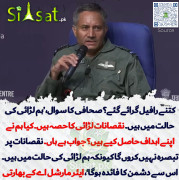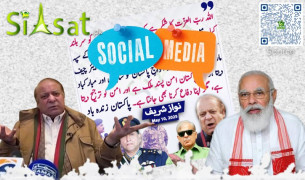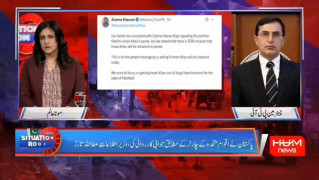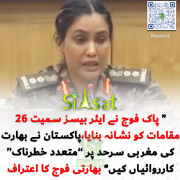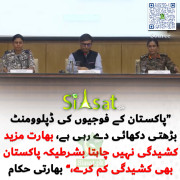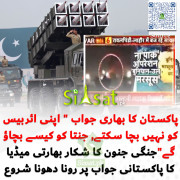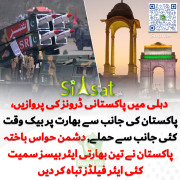modern.fakir
Chief Minister (5k+ posts)
Istighatha
Istighatha/Isti’ana/Istamdad means “Beseeching for help”
In Light of Qur'an
**إِيَّاكَ نَعْبُدُ وَ إِيَّاكَ نَسْتَعِينُ
.
Translation: Thee do we worship, “AND” Thine aid we seek.[Al-Fatiha:5]
There are three very important points derived from this verse of Glorious Qur'an
(A) Allah differentiated between "worship" and "asking for help" by putting “AND (و)” in-between the two, so had worship and asking for help been the same things then Allah would not have differentiated between them, rather it would have been only said: "Iyyaka Na’budu Iyyaka Nasta’in" (Thee do we worship, thine aid we seek), therefore different ruling shall apply on Istighatha depending on the nature of it whereas worship of any kind directed towards anyone other than Allah is an absolute Shirk/Kufr.
(B) This verse proves that real help is from none but Allah azza Wajjal, whosoever believes that someone/something other than Allah provides “Haqeeqi (real)” and “independent” help then such a person is Mushrik, so it should always be embedded in hearts and minds that the cause and effect is only created by Allah in all cases.
(C) This verse is general and does not differentiate between seeking help from an alive or dead. Hence same ruling shall apply in both cases, those who say that you can ask alive people for help but not pious people who have passed away, they have no proof whatsoever, rather they misuse this verse by giving false interpretation. Remember false interpretation to Qur'an can lead to hell fire. If their logic was true then according to this verse even asking for help from alive should be shirk. Some people would be surprised to know that Ahlus Sunnah considers it shirk even to ask an alive person for help in the wrong manner.
In Qur'an itself the Prophets have asked help from other than Allah at many occasions and the Awliya even did marvelous acts of Karamah, for example
1. Qur'an states: (Sulayman) said:“O court members, which one of you can bring me her throne before they come humbled in my presence? An extremely strong jinn said, “I will bring it in your presence before you disperse the assembly; and I am indeed strong and trustworthy upon it.” Said one who had knowledge of the Book, “I will bring it in your majesty’s presence "WITHIN THE TWINKLING OF AN EYE"” then when he saw it set in his presence*, Sulaiman said, “This is of the favours of my Lord; so that He may test me whether I give thanks or am ungrateful; and whoever gives thanks only gives thanks for his own good; and whoever is ungrateful – then indeed my Lord is the Independent (Not Needing Anything), the Owner Of All Praise.” (A miracle which occurred through one of Allah’s friends) [Surah an-Naml (27:38-40)]
(27:40)
These Quranic verses prove that Solomon (AS) asked for help from his assembly of "Jinn and Men" then a man (saint called Asif) who had knowledge of the book brought it in “BLINK OF AN EYE”. We all know that throne of Queen Balkees was thousands of miles away, so how did that man bring it in blink of an eye? And why did Solomon ask his subordinates and not Allah? The simple answer to this is that it all happened with the will of Allah and Istighatha with this firm belief is perfectly allowed whether we are asking someone alive or a pious personality who has passed away
2. Qur'an states: Verily, your Walee (Protector or Helper) is Allah, His Messenger, and the believers, - those who perform As-Salat (Iqamat-as-Salat), and give Zakat, and they bow down (submit themselves with obedience to Allah in prayer). [Muhsin/Hilali 5:55]
*The Following verse is very important to understand, rather is a lightening from Lord Almighty upon those who deny Istighatha*
إِذْ قَالَ ٱللَّهُ يَٰعِيسَى ٱبْنَ مَرْيَمَ ٱذْكُرْ نِعْمَتِى عَلَيْكَ وَعَلَىٰ وَٰلِدَتِكَ إِذْ أَيَّدتُّكَ بِرُوحِ ٱلْقُدُسِ تُكَلِّمُ ٱلنَّاسَ فِى ٱلْمَهْدِ وَكَهْلًا ۖ وَإِذْ عَلَّمْتُكَ ٱلْكِتَٰبَ
وَٱلْحِكْمَةَ وَٱلتَّوْرَىٰةَ وَٱلْإِنجِيلَ ۖ وَإِذْ تَخْلُقُ مِنَ ٱلطِّينِ كَهَيْـَٔةِ ٱلطَّيْرِ بِإِذْنِى فَتَنفُخُ فِيهَا فَتَكُونُ طَيْرًۢا بِإِذْنِى ۖ وَتُبْرِئُ ٱلْأَكْمَهَ وَٱلْأَبْرَصَ بِإِذْنِى ۖ وَإِذْ
تُخْرِجُ ٱلْمَوْتَىٰ بِإِذْنِى ۖ وَإِذْ كَفَفْتُ بَنِىٓ إِسْرَٰٓءِيلَ عَنكَ إِذْ جِئْتَهُم بِٱلْبَيِّنَٰتِ فَقَالَ ٱلَّذِينَ كَفَرُوا۟ مِنْهُمْ إِنْ هَٰذَآ إِلَّا سِحْرٌ مُّبِينٌ
.
3. Qur'an states: When Allah will say, “O Eisa, the son of Maryam! Remember My favour upon you and your mother; when I supported you with the Holy Spirit; you were speaking to people from the cradle and in maturity; and when I taught you the Book and wisdom and the Taurat and the Injeel; and when you used to mould a bird-like sculpture from clay, by My command, and blow into it – so it (the living bird) used to fly by My command, and you used to cure him who was born blind and cure the leper, by My command; "AND WHEN YOU USED TO RAISE UP THE DEAD, BY MY COMMAND"and when I restrained the Descendants of Israel against you when you came to them with clear proofs, and the disbelievers among them said, ‘This is nothing but clear magic’ [(Surah al-Ma’idah (5:110)]
It is our firm belief that Only Allah brings back from dead, It is our firm belief that only Allah cures the lepers, It is our firm belief that only Allah blows life into bodies, so why has Allah made these as "Granted" qualities of Jesus (AS) too? The simple answer is given in verse itself i.e. all of this happens with the "Will of Allah" hence Istighatha (help) from Prophets and Awliya is not their personal power but in reality power of Allah. With this belief seekingtheir help could never be Shirk rather this is highest stage of Irfan (deep knowledge).
4. Qur'an also states: If only they had been content with what Allah and His Messenger gave them, and had said, "Sufficient unto us is Allah! Allah and His Messenger will soon give us of His bounty: to Allah do we turn our hopes!" (that would have been the right course).(9:59)
5. Qur'an states at another place: If ye two turn in repentance to Him, your hearts are indeed so inclined; But if ye back up each other against him, truly God is his Protector, “AND GIBRIEL, AND (EVERY) RIGHTEOUS ONE” among those who believe,- and furthermore, the angels - will back (him) up.(66:4)
Here Allah has Himself applied the word “MAWLA (PROTECTOR)” with Himself, also Gibriel and other believers.
6. Qur'an states: But when Jesus became conscious of their disbelief, he cried: Who will be “MY HELPERS” in the cause of Allah? The disciples said: We will be Allah's helpers. We believe in Allah, and bear thou witness that we have surrendered (unto Him).(Yusuf Ali, 3:52)
After reading this verse we would like you to scroll up and read the point (c) which was mentioned in reference to Surah Fatiha’s ayah.
7. Qur'an states: And ask those of Our messengers whom We sent before thee: Did We ever appoint gods to be worshipped beside the Beneficent? (43:45)
Here Allah is directly teaching the Prophet (Peace be upon him) to ask previous Messengers, interpretation that this verse refers to asking the knowledgeable Jews and Christians of his time does not do justice to the clear wording of Qur'an itself.
In Light of Hadith
Hadith # 1
In Mishqaat ul Masabih It states:
سل فقلت أسألك مرافقتك في الجنة . قال أو غير ذلك ؟ . قلت هو ذاك . قال فأعني على نفسك بكثرة السجود . رواه مسلم
Translation: The Prophet (Peace be upon him) said to Sayyidna Ka'b (RA): Ask for something (O Ka'b). Ka'b (ra) said: I ask for your companionship in Jannah. The Prophet said: Do you want something else? He replied: Just this, the Prophet (saw) then said: help me by doing more prostrations – Taken from (Sahih) Muslim [Mishqat ul Misabih, Volume No. 1 Page No. 156, Published by Maktaba al Mishkaat]
This hadith proves that the Sahabi asked for paradise from Prophet (صلى الله عليه وسلم) and the Prophet (صلى الله عليه وسلم) in return told him to ask for more!! The Prophet (صلى الله عليه وسلم) did not say that you asked for Jannah from Ghair Ullah, hence you have become Mushrik!
Sheikh Abdul Haqq Muhadith Dhelvi (rah) writes under this hadith:
The meaning of Prophet (Peace be upon him) saying “ASK” and not restricting it to something specific proves that all things are in hands of Prophet (Peace be upon him) and he can grant anyone whatsoever he wishes through the grant of Allah, because the world and hereafter are his Sikhawat and the knowledge of Loh and Qalam is part of his Uloom, If you are in need of anything relating to world or hereafter then come to the Prophet (Peace be upon him) and get your need fulfilled. [Ash’at ul Lamaat, Sharah al Mishqaat, Volume No.2, Page No. 247]
Mullah Ali Qari (rah) says:
يؤخذ من إطلاقه عليه السلام الأمر بالسؤال أن الله تعالى مكنه من إعطاء كل ما أراد من خزائن الحق
Translation: The Prophet (Peace be upon him) saying to “ASK” refers to Allah giving him capability to grant anything from the “TREASURES OF ALLAH” [Mirqat Sharh al Mishqaat (2/615)]
He also said:
وذكر ابن سبع في خصائصه وغيره إن الله تعالى أقطعه أرض الجنة يعطي منها ما شاء لمن شاء
Translation: Imam Ibn Sabih and others have mentioned it in qualities of Prophet (Peace be upon him) that Allah has granted the land of Jannah to Prophet (Peace be upon him) so that he can grant whosoever he wishes [Mirqaat Sharh al Mishqaat (2/615)]
Hadith # 2
Narrated Jabir bin 'Abdullah Al-Ansari: Allah's Apostle said, "Name yourselves after me (by my name) but do not call (yourselves) by my Kuniya, for I am Al-Qasim (distributor), and I distribute among you Allah's blessings." This narration has also come on the authority of Anas that the ! Prophet said so."
►Volume 8, Book 73, Number 216: (Sahih Bukhari)
So Allah is the granter and the Prophet (Peace be upon him) is distributor, hence this hadith proves the Waseela of Prophet (Peace be upon him). Without any doubt. It should be known that Istighatha is nothing but Waseela in real sense and belief of Muslims is always that real grant is from Allah alone.
Hadith # 3
Volume 2, Book 24, Number 553: (Sahih Bukhari)
Narrated 'Abdullah bin 'Umar The Prophet said, "A man keeps on asking others for something till he comes on the Day of Resurrection without any piece of flesh on his face." The Prophet added, "On the Day of Resurrection, the Sun will come near (to, the people) to such an extent that the sweat will reach up to the middle of the ears, so, when all the people are in that state, they will ask Adam for help (استغاثو), and then Moses, and then Muhammad (p.b.u.h) The sub-narrator added "Muhammad will intercede with Allah to judge amongst the people. He will proceed on till he will hold the ring of the door (of Paradise) and then Allah will exalt him to Maqam Mahmud (the privilege of intercession, etc.). And all the people of the gathering will send their praises to Allah.
Now remember people will run towards Prophets for help, clearly word Istighatha has been used in this hadith, this proves that had Istighatha been shirk then it could never be allowed on day of judgment and all those Prophets would have rather told the people to run towards Allah alone rather than next prophet!
Hadith # 4
17104- وعن ابن عباس أن رسول الله صلى الله عليه وسلم قال:
"إن لله ملائكة في الأرض سوى الحفظة يكتبون ما يسقط من ورق الشجر، فإذا أصاب أحدكم عرجة بأرض فلاة فليناد: أعينوا عباد الله".
رواه البزار ورجاله ثقات.
Translation: Allah has angels on the earth - other than the [two] record-keepers - who keep a record [even] of the leaves that fall on the ground. Therefore, if one of you is crippled in a deserted land where no-one is in sight, let him cry out: Help O servants of Allah
Imam al Haytami (rah) said after this hadith: It is narrated by Al-Bazzar and all its narrators are reliable (thiqa) [Reference: Majma az Zawaid, Volume 10, Hadith No. 17104]
This hadith is not only authentic but rather it has been “PRACTICED UPON” by great Imams
عبد الله بن أحمد بن حنبل قال سمعت أبي يقول حججت خمس حجج اثنتين راكب وثلاث ماشي أو ثلاث راكب واثنتين ماشي فضللت الطريق في حجة وكنت ماشيا فجعلت أقول يا عباد الله دلوني على الطريق قال فلم أزل أقول ذلك حتى وقفت على الطريق أو كما قال أبي
Translation: Abdullah bin Ahmed bin Hanbal (rah) said that he heard his father (Imam Ahmed) who said: I performed Hajj 5 times, thrice on foot and twice on ride or he said thrice on ride and twice on foot, once when I was on foot I lost my way hence I started to exclaim this: O Allah’s servants show me the way(يا عباد الله دلوني على الطريق), I kept on repeating this until I came back on track. [Imam Baihaqi in Shu’ayb ul Iman, Volume 6, Page No 128, Hadith No. 7697]
.
13737-:"إِذَا أَضَلَّ أَحَدُكُمْ شَيْئًا أَوْ أَرَادَ أَحَدُكُمْ عَوْنًا وَهُوَ بِأَرْضٍ لَيْسَ بِهَا أَنِيسٌ، فَلْيَقُلْ:"يَا عِبَادَ اللَّهِ أَغِيثُونِي، يَا عِبَادَ اللَّهِ أَغِيثُونِي، فَإِنَّ لِلَّهِ عِبَادًا لا نَرَاهُمْ"، وَقَدْ جَرَّبَ ذَلِكَ .
After Imam At-Tabarani transmitted the hadith of calling out : O Servants of Allah, Help me! In his Mu'jam al Kabir (17/117) he said “this has been acted upon (وَقَدْ جَرَّبَ ذَلِكَ)”
So Alhamdulillah the great Muhaditheen themselves acted upon it and approved it, had there been a hint of shirk in this then they would have mentioned it!
Imam al-Nawawi (rah) said:
قلت: حكى لي بعض شيوخنا الكبار في العلم أنه افلتت له دابّة أظنُّها بغلة، وكان يَعرفُ هذا الحديث، فقاله؛ فحبسَها اللّه عليهم في الحال. وكنتُ أنا مرّةً مع جماعة، فانفلتت منها بهيمةٌ وعجزوا عنها، فقلته، فوقفت في الحال بغيرِ سببٍ سوى هذا الكلام.
Translation: ‘One of our major (kibar) scholars in knowledge related to me that he lost his means of transport, which I presume was a mule, and he was aware of this hadith and said (the du’a) so Allah brought to him his animal immediately. ‘I was once with a group of people and my animal fled and the people failed (to find it) and I said (the du’a) and I found the animal immediately without any means but this statement.[Kitab ul Adhkaar by Imam Nawawi, Page No. 370, Published by Dar al Manhaaj, Beirut, Lebanon]
Imam Mullah Ali Qari (Rahimuhullah) also in Sharah of Hinsul Hasin writes that our Prophet (May Allah bless him and grant him peace) said that:
اذا انفلتت دابة احد كم بارض فلاة فليناد يا عباد الله احبسوا
Translation: If the animal of someone runs loose in jungle, then he should say: O Allah’s servants stop it
He writes under “Ibaad Allah”
المراد بهم الملىكة او المسلمون من الجن او رجال الغيب المستمون بابدال
Translation: It means the angels, Muslims, jinn or men of unseen i.e. Abdaal
Then he writes:
هزا حديث حسن يحتاج اليه المسافرون وانه مجرب
Translation: This hadith is Hassan and the travelers are in urgent need of it and this has been acted upon [Sharah Hisn ul Hasin, Al-Hirz al-Thamin, page 378]
Hadith # 5
حدثتني ميمونة بنت الحارث زوج النبي صلى الله عليه وسلم
أن رسول الله صلى الله عليه وسلم بات عندها ليلتها فقام يتوضأ للصلاة فسمعته يقول في متوضئه لبيك لبيك ثلاثا نصرت نصرت ثلاثا فلما خرج قلت يا رسول الله سمعتك تقول في متوضئك لبيك لبيك ثلاثا نصرت نصرت ثلاثا كأنك تكلم إنسانا فهل كان معك أحد فقال هذا راجز بني كعب يستصرخني ويزعم أن قريشا أعانت عليهم بني بكر
Translation: Maymuna bint Harith, the blessed wife of Prophet (Peace be upon him) narrates: The Prophet (Peace be upon him) was doing Wudhu for Tahajjud Salaah at the home of Hazrat Maimuna (radi Allahu anha).He suddenly called out three times, "Labbaik, Labbaik, Labbaik!" (Here I am) and "Nusirtu, Nusirtu, Nusirtu!" (I helped you). Hadhrat Maimuna (Radhi Allaho anha) further asked him why he had called out those words". He replied: "Raajiz (a sahabi from far) was calling me because Quraish wanted to kill him"[Imam Tabarani in Mu’jam as-Sagheer, Volume No.2, Hadith # 968]
What actually happened was that the Quraish wanted to kill Hazrat Umar bin Saalim Raajiz (radi Allahu anhu) as he was on the road leading to Madinatul Munawwarah. He called out: Prophet (Peace be upon hijm): Help me or else the enemies will kill me!" Sayyiduna Rasoolullah (sallal laahu alaihi wasallam) responded to his call from home and saved him from death.
Sheikh Abdul Haqq Muhadith Dhelvi (Rahimuhullah), who came from Arabia to subcontinent in order to spread the knowledge of hadith, he is respected highly by all Muslims (including Ghair Muqalideen) , he says:
I wish my intellect was owned by people who reject beseeching for help from Awliya, so what do they understand from it? What we understand is that the one making dua is dependent upon Allah, and he makes dua to Allah, asks Him for his Hajah and presents the Wasila of Allah’s friend , he says: O Allah, the blessings which you have bestowed upon this friend of yours, please grant me something through his wasila, as you are the best of givers, the second case is that one calls out (nida) the Wali and makes him Mukhatib and says: "O Slave of Allah, O Allah’s friend, do my Shaf’aat and make this dua to Allah that he grants me my need" Hence the one who grants and the one who fulfills the need (in both cases) is “ONLY ALLAH” , the man in-between is just an intercessor , whereas the Qadir, Fa’il, one who brings about change is only Allah [Sharah al Mishkaat, Ash’atul Lamaat, Volume No. 3, Page No. 401]
Imam Shams ud-din Al Ramli (Rahimuhullah) on Istighatha
سئل ) عما يقع من العامة من قولهم عند الشدائد يا شيخ فلان يا رسول الله ونحو ذلك من الاستغاثة بالأنبياء والمرسلين والأولياء والعلماء والصالحين فهل ذلك جائز أم لا وهل للرسل والأنبياء والأولياء والصالحين والمشايخ إغاثة بعد موتهم وماذا يرجح ذلك ؟
فأجاب ) بأن الاستغاثة بالأنبياء والمرسلين والأولياء والعلماء والصالحين جائزة وللرسل والأنبياء والأولياء والصالحين إغاثة بعد موتهم ؛ لأن معجزة الأنبياء وكرامات الأولياء لا تنقطع بموتهم . أما الأنبياء فلأنهم أحياء في قبورهم يصلون ويحجون كما وردت به الأخبار وتكون الإغاثة منهم معجزة لهم . والشهداء أيضا أحياء شوهدوا نهارا جهارا يقاتلون الكفار . وأما الأولياء فهي كرامة لهم فإن أهل الحق على أنه يقع من الأولياء بقصد وبغير قصد أمور خارقة للعادة يجريها الله تعالى بسببهم والدليل على جوازها أنها أمور ممكنة لا يلزم من جواز وقوعها محال وكل ما هذا شأنه فهو جائز الوقوع وعلى الوقوع قصة مريم ورزقها الآتي من عند الله على ما نطق به التنزيل وقصة أبي بكر ، وأضيافه كما في الصحيح وجريان النيل بكتاب عمر ورؤيته وهو على المنبر بالمدينة جيشه بنهاوند حتى قال لأمير الجيش يا سارية الجبل محذرا له من وراء الجبل لكمين العدو هناك ، وسماع سارية كلامه وبينهما مسافة شهرين ، وشرب خالد السم من غير تضرر به . وقد جرت خوارق على أيدي الصحابة والتابعين ومن بعدهم لا يمكن إنكارها لتواتر مجموعها ، وبالجملة ما جاز أن يكون معجزة لنبي جاز أن يكون كرامة لولي لا فارق بينهما إلا التحدي
Question:
That which occurs amongst the general public who when in distress call out Ya Sheikh Fulan and Ya Rasul Ullah and other such things in seeking help (Istighatha) from the Prophets, the saints, Ulama and upright people. Is this allowed or not? Do the Messengers/Prophets/Saints/righteous/Mashaikh have the capability to help others...
Answer:
Istighatha i.e. Seeking Help from the Prophets and Messengers, the Saints, Ulama and upright people is“PERMITTED” after their passing away. The messengers, prophets and saints have (power to) help after their passing away because their miracles do not become abolished after their deaths. The Prophets are alive in their graves, praying and also performing hajj as it has been mentioned in many ahadith. Therefore the help from them shall be a miracle from them, the martyrs are also alive which is proven that they have been seen openly killing the disbelievers.
Now regarding Awliya then this is a Karamat from them, the people of truth believe that this happens from (the hands) of awliya both with their intention and without it. Having a change in outer aspects of things is brought forward by Allah through them. The Dalil for this is that these things are possible and their occurrence is not something impossible, for example the story of Maryam (a.s) and how the provision came to her from Allah as is stated in Quran and the incident of Abu Bakr (ra) with his guests as is present in Sahih, the Nile flowing to its full due to letter of Umar (ra) plus him also seeing right from his mimbar in madina, the army approaching (Sariya ra) and he exclaiming to the leader: “Ya Sariyatul Jabal (i.e. O Sariya turn to the mountain)” i.e. warning him about the enemy behind the mountain and Sariya (ra) even heard him though he was so far that it would take 2 months of travel. Also Khalid bin Walid (ra) drinking poison but it not harming him. The matters which generally go against the norm have for sure occurred from the hands of Sahaba, Tabiyeen, and those later to come. It cannot be possible to deny this fact because when we take this as a whole then they reach the level of Tawatur (i.e. definitely known reality).Hence what is possible as a miracle from Prophet is also possible as Karamah from a Saint, there is no difference between the two except for the fact that former is shown as a challenge [Fatawa al Ramli]
Sheikh ul Islam Imam al-Subki (rah)
Let us see the Introduction of this magnificent scholar, the real Sheikh ul Islam of his time.
Imam Jalal ud-din Suyuti (rah) said about Imam al Subki:
الإمام الفقيه المحدث الحافظ المفسر الأصولي النحوي اللغوي الأديب المجتهد تقي الدين أبو الحسن علي بن عبد الكافي بن علي بن تمام بن يوسف بن
موسى بن تمام بن حامد بن يحيى بن عمر بن عثمان بن علي بن سوار بن سليم.
شيخ الإسلام إمام العصر
Translation: Al-Imam, Al-Faqih, Al-Muhadith, Al-Hafidh, Al-Mufasir, Al-Asooli, Al-Nahwi, Al-Laghwi, Al-Adeeb, Al-Mujtahid "Taqi ud-din Abu al-Hasan Ali bin Abdul Kafi bin Ali bin Tamaam bin Yusuf bin Musa bin Tamam bin Hamid bin Yahya bin Umar bin Uthman bin Ali bin Sawwar bin Saleem "SHEIKH UL ISLAM AND THE IMAM OF HIS TIME" [Tabaqat al Hufaadh (1/525)]
Sheikh ul Islam Imam al- Subki said: It should be known that Tawassul, "ASKING FOR HELP" and intercession through the Prophet (Peace be upon him) in the court of Allah is not only allowed but is "RECOMMENDED" It being Legal and recommended is a known fact for everyone who has understanding of deen, this is a deed of Prophets/Messengers, the salaf-as-Saliheen, the Ulama and general public of Muslims, none of them denied it nor in any time these deeds were called as bad except for when Ibn Taymiyyah (came in picture) and he started to reject them, his sayings made the weak get into confusion/dilemma, he did such a Bidah which nobody before him had done... [Imam Taqi ud din as-Subki – Rahimuhulllah in his magnificent work called Shifa us Siqaam fi Ziyaratal Khayr al Anaam, Page No. 357] Click here for Scanned Page (8
Istighatha/Isti’ana/Istamdad means “Beseeching for help”
In Light of Qur'an
**إِيَّاكَ نَعْبُدُ وَ إِيَّاكَ نَسْتَعِينُ
.
Translation: Thee do we worship, “AND” Thine aid we seek.[Al-Fatiha:5]
There are three very important points derived from this verse of Glorious Qur'an
(A) Allah differentiated between "worship" and "asking for help" by putting “AND (و)” in-between the two, so had worship and asking for help been the same things then Allah would not have differentiated between them, rather it would have been only said: "Iyyaka Na’budu Iyyaka Nasta’in" (Thee do we worship, thine aid we seek), therefore different ruling shall apply on Istighatha depending on the nature of it whereas worship of any kind directed towards anyone other than Allah is an absolute Shirk/Kufr.
(B) This verse proves that real help is from none but Allah azza Wajjal, whosoever believes that someone/something other than Allah provides “Haqeeqi (real)” and “independent” help then such a person is Mushrik, so it should always be embedded in hearts and minds that the cause and effect is only created by Allah in all cases.
(C) This verse is general and does not differentiate between seeking help from an alive or dead. Hence same ruling shall apply in both cases, those who say that you can ask alive people for help but not pious people who have passed away, they have no proof whatsoever, rather they misuse this verse by giving false interpretation. Remember false interpretation to Qur'an can lead to hell fire. If their logic was true then according to this verse even asking for help from alive should be shirk. Some people would be surprised to know that Ahlus Sunnah considers it shirk even to ask an alive person for help in the wrong manner.
In Qur'an itself the Prophets have asked help from other than Allah at many occasions and the Awliya even did marvelous acts of Karamah, for example
1. Qur'an states: (Sulayman) said:“O court members, which one of you can bring me her throne before they come humbled in my presence? An extremely strong jinn said, “I will bring it in your presence before you disperse the assembly; and I am indeed strong and trustworthy upon it.” Said one who had knowledge of the Book, “I will bring it in your majesty’s presence "WITHIN THE TWINKLING OF AN EYE"” then when he saw it set in his presence*, Sulaiman said, “This is of the favours of my Lord; so that He may test me whether I give thanks or am ungrateful; and whoever gives thanks only gives thanks for his own good; and whoever is ungrateful – then indeed my Lord is the Independent (Not Needing Anything), the Owner Of All Praise.” (A miracle which occurred through one of Allah’s friends) [Surah an-Naml (27:38-40)]
(27:40)
These Quranic verses prove that Solomon (AS) asked for help from his assembly of "Jinn and Men" then a man (saint called Asif) who had knowledge of the book brought it in “BLINK OF AN EYE”. We all know that throne of Queen Balkees was thousands of miles away, so how did that man bring it in blink of an eye? And why did Solomon ask his subordinates and not Allah? The simple answer to this is that it all happened with the will of Allah and Istighatha with this firm belief is perfectly allowed whether we are asking someone alive or a pious personality who has passed away
2. Qur'an states: Verily, your Walee (Protector or Helper) is Allah, His Messenger, and the believers, - those who perform As-Salat (Iqamat-as-Salat), and give Zakat, and they bow down (submit themselves with obedience to Allah in prayer). [Muhsin/Hilali 5:55]
*The Following verse is very important to understand, rather is a lightening from Lord Almighty upon those who deny Istighatha*
إِذْ قَالَ ٱللَّهُ يَٰعِيسَى ٱبْنَ مَرْيَمَ ٱذْكُرْ نِعْمَتِى عَلَيْكَ وَعَلَىٰ وَٰلِدَتِكَ إِذْ أَيَّدتُّكَ بِرُوحِ ٱلْقُدُسِ تُكَلِّمُ ٱلنَّاسَ فِى ٱلْمَهْدِ وَكَهْلًا ۖ وَإِذْ عَلَّمْتُكَ ٱلْكِتَٰبَ
وَٱلْحِكْمَةَ وَٱلتَّوْرَىٰةَ وَٱلْإِنجِيلَ ۖ وَإِذْ تَخْلُقُ مِنَ ٱلطِّينِ كَهَيْـَٔةِ ٱلطَّيْرِ بِإِذْنِى فَتَنفُخُ فِيهَا فَتَكُونُ طَيْرًۢا بِإِذْنِى ۖ وَتُبْرِئُ ٱلْأَكْمَهَ وَٱلْأَبْرَصَ بِإِذْنِى ۖ وَإِذْ
تُخْرِجُ ٱلْمَوْتَىٰ بِإِذْنِى ۖ وَإِذْ كَفَفْتُ بَنِىٓ إِسْرَٰٓءِيلَ عَنكَ إِذْ جِئْتَهُم بِٱلْبَيِّنَٰتِ فَقَالَ ٱلَّذِينَ كَفَرُوا۟ مِنْهُمْ إِنْ هَٰذَآ إِلَّا سِحْرٌ مُّبِينٌ
.
3. Qur'an states: When Allah will say, “O Eisa, the son of Maryam! Remember My favour upon you and your mother; when I supported you with the Holy Spirit; you were speaking to people from the cradle and in maturity; and when I taught you the Book and wisdom and the Taurat and the Injeel; and when you used to mould a bird-like sculpture from clay, by My command, and blow into it – so it (the living bird) used to fly by My command, and you used to cure him who was born blind and cure the leper, by My command; "AND WHEN YOU USED TO RAISE UP THE DEAD, BY MY COMMAND"and when I restrained the Descendants of Israel against you when you came to them with clear proofs, and the disbelievers among them said, ‘This is nothing but clear magic’ [(Surah al-Ma’idah (5:110)]
It is our firm belief that Only Allah brings back from dead, It is our firm belief that only Allah cures the lepers, It is our firm belief that only Allah blows life into bodies, so why has Allah made these as "Granted" qualities of Jesus (AS) too? The simple answer is given in verse itself i.e. all of this happens with the "Will of Allah" hence Istighatha (help) from Prophets and Awliya is not their personal power but in reality power of Allah. With this belief seekingtheir help could never be Shirk rather this is highest stage of Irfan (deep knowledge).
4. Qur'an also states: If only they had been content with what Allah and His Messenger gave them, and had said, "Sufficient unto us is Allah! Allah and His Messenger will soon give us of His bounty: to Allah do we turn our hopes!" (that would have been the right course).(9:59)
5. Qur'an states at another place: If ye two turn in repentance to Him, your hearts are indeed so inclined; But if ye back up each other against him, truly God is his Protector, “AND GIBRIEL, AND (EVERY) RIGHTEOUS ONE” among those who believe,- and furthermore, the angels - will back (him) up.(66:4)
Here Allah has Himself applied the word “MAWLA (PROTECTOR)” with Himself, also Gibriel and other believers.
6. Qur'an states: But when Jesus became conscious of their disbelief, he cried: Who will be “MY HELPERS” in the cause of Allah? The disciples said: We will be Allah's helpers. We believe in Allah, and bear thou witness that we have surrendered (unto Him).(Yusuf Ali, 3:52)
After reading this verse we would like you to scroll up and read the point (c) which was mentioned in reference to Surah Fatiha’s ayah.
7. Qur'an states: And ask those of Our messengers whom We sent before thee: Did We ever appoint gods to be worshipped beside the Beneficent? (43:45)
Here Allah is directly teaching the Prophet (Peace be upon him) to ask previous Messengers, interpretation that this verse refers to asking the knowledgeable Jews and Christians of his time does not do justice to the clear wording of Qur'an itself.
In Light of Hadith
Hadith # 1
In Mishqaat ul Masabih It states:
سل فقلت أسألك مرافقتك في الجنة . قال أو غير ذلك ؟ . قلت هو ذاك . قال فأعني على نفسك بكثرة السجود . رواه مسلم
Translation: The Prophet (Peace be upon him) said to Sayyidna Ka'b (RA): Ask for something (O Ka'b). Ka'b (ra) said: I ask for your companionship in Jannah. The Prophet said: Do you want something else? He replied: Just this, the Prophet (saw) then said: help me by doing more prostrations – Taken from (Sahih) Muslim [Mishqat ul Misabih, Volume No. 1 Page No. 156, Published by Maktaba al Mishkaat]
This hadith proves that the Sahabi asked for paradise from Prophet (صلى الله عليه وسلم) and the Prophet (صلى الله عليه وسلم) in return told him to ask for more!! The Prophet (صلى الله عليه وسلم) did not say that you asked for Jannah from Ghair Ullah, hence you have become Mushrik!
Sheikh Abdul Haqq Muhadith Dhelvi (rah) writes under this hadith:
The meaning of Prophet (Peace be upon him) saying “ASK” and not restricting it to something specific proves that all things are in hands of Prophet (Peace be upon him) and he can grant anyone whatsoever he wishes through the grant of Allah, because the world and hereafter are his Sikhawat and the knowledge of Loh and Qalam is part of his Uloom, If you are in need of anything relating to world or hereafter then come to the Prophet (Peace be upon him) and get your need fulfilled. [Ash’at ul Lamaat, Sharah al Mishqaat, Volume No.2, Page No. 247]
Mullah Ali Qari (rah) says:
يؤخذ من إطلاقه عليه السلام الأمر بالسؤال أن الله تعالى مكنه من إعطاء كل ما أراد من خزائن الحق
Translation: The Prophet (Peace be upon him) saying to “ASK” refers to Allah giving him capability to grant anything from the “TREASURES OF ALLAH” [Mirqat Sharh al Mishqaat (2/615)]
He also said:
وذكر ابن سبع في خصائصه وغيره إن الله تعالى أقطعه أرض الجنة يعطي منها ما شاء لمن شاء
Translation: Imam Ibn Sabih and others have mentioned it in qualities of Prophet (Peace be upon him) that Allah has granted the land of Jannah to Prophet (Peace be upon him) so that he can grant whosoever he wishes [Mirqaat Sharh al Mishqaat (2/615)]
Hadith # 2
Narrated Jabir bin 'Abdullah Al-Ansari: Allah's Apostle said, "Name yourselves after me (by my name) but do not call (yourselves) by my Kuniya, for I am Al-Qasim (distributor), and I distribute among you Allah's blessings." This narration has also come on the authority of Anas that the ! Prophet said so."
►Volume 8, Book 73, Number 216: (Sahih Bukhari)
So Allah is the granter and the Prophet (Peace be upon him) is distributor, hence this hadith proves the Waseela of Prophet (Peace be upon him). Without any doubt. It should be known that Istighatha is nothing but Waseela in real sense and belief of Muslims is always that real grant is from Allah alone.
Hadith # 3
Volume 2, Book 24, Number 553: (Sahih Bukhari)
Narrated 'Abdullah bin 'Umar The Prophet said, "A man keeps on asking others for something till he comes on the Day of Resurrection without any piece of flesh on his face." The Prophet added, "On the Day of Resurrection, the Sun will come near (to, the people) to such an extent that the sweat will reach up to the middle of the ears, so, when all the people are in that state, they will ask Adam for help (استغاثو), and then Moses, and then Muhammad (p.b.u.h) The sub-narrator added "Muhammad will intercede with Allah to judge amongst the people. He will proceed on till he will hold the ring of the door (of Paradise) and then Allah will exalt him to Maqam Mahmud (the privilege of intercession, etc.). And all the people of the gathering will send their praises to Allah.
Now remember people will run towards Prophets for help, clearly word Istighatha has been used in this hadith, this proves that had Istighatha been shirk then it could never be allowed on day of judgment and all those Prophets would have rather told the people to run towards Allah alone rather than next prophet!
Hadith # 4
17104- وعن ابن عباس أن رسول الله صلى الله عليه وسلم قال:
"إن لله ملائكة في الأرض سوى الحفظة يكتبون ما يسقط من ورق الشجر، فإذا أصاب أحدكم عرجة بأرض فلاة فليناد: أعينوا عباد الله".
رواه البزار ورجاله ثقات.
Translation: Allah has angels on the earth - other than the [two] record-keepers - who keep a record [even] of the leaves that fall on the ground. Therefore, if one of you is crippled in a deserted land where no-one is in sight, let him cry out: Help O servants of Allah
Imam al Haytami (rah) said after this hadith: It is narrated by Al-Bazzar and all its narrators are reliable (thiqa) [Reference: Majma az Zawaid, Volume 10, Hadith No. 17104]
This hadith is not only authentic but rather it has been “PRACTICED UPON” by great Imams
عبد الله بن أحمد بن حنبل قال سمعت أبي يقول حججت خمس حجج اثنتين راكب وثلاث ماشي أو ثلاث راكب واثنتين ماشي فضللت الطريق في حجة وكنت ماشيا فجعلت أقول يا عباد الله دلوني على الطريق قال فلم أزل أقول ذلك حتى وقفت على الطريق أو كما قال أبي
Translation: Abdullah bin Ahmed bin Hanbal (rah) said that he heard his father (Imam Ahmed) who said: I performed Hajj 5 times, thrice on foot and twice on ride or he said thrice on ride and twice on foot, once when I was on foot I lost my way hence I started to exclaim this: O Allah’s servants show me the way(يا عباد الله دلوني على الطريق), I kept on repeating this until I came back on track. [Imam Baihaqi in Shu’ayb ul Iman, Volume 6, Page No 128, Hadith No. 7697]
.
13737-:"إِذَا أَضَلَّ أَحَدُكُمْ شَيْئًا أَوْ أَرَادَ أَحَدُكُمْ عَوْنًا وَهُوَ بِأَرْضٍ لَيْسَ بِهَا أَنِيسٌ، فَلْيَقُلْ:"يَا عِبَادَ اللَّهِ أَغِيثُونِي، يَا عِبَادَ اللَّهِ أَغِيثُونِي، فَإِنَّ لِلَّهِ عِبَادًا لا نَرَاهُمْ"، وَقَدْ جَرَّبَ ذَلِكَ .
After Imam At-Tabarani transmitted the hadith of calling out : O Servants of Allah, Help me! In his Mu'jam al Kabir (17/117) he said “this has been acted upon (وَقَدْ جَرَّبَ ذَلِكَ)”
So Alhamdulillah the great Muhaditheen themselves acted upon it and approved it, had there been a hint of shirk in this then they would have mentioned it!
Imam al-Nawawi (rah) said:
قلت: حكى لي بعض شيوخنا الكبار في العلم أنه افلتت له دابّة أظنُّها بغلة، وكان يَعرفُ هذا الحديث، فقاله؛ فحبسَها اللّه عليهم في الحال. وكنتُ أنا مرّةً مع جماعة، فانفلتت منها بهيمةٌ وعجزوا عنها، فقلته، فوقفت في الحال بغيرِ سببٍ سوى هذا الكلام.
Translation: ‘One of our major (kibar) scholars in knowledge related to me that he lost his means of transport, which I presume was a mule, and he was aware of this hadith and said (the du’a) so Allah brought to him his animal immediately. ‘I was once with a group of people and my animal fled and the people failed (to find it) and I said (the du’a) and I found the animal immediately without any means but this statement.[Kitab ul Adhkaar by Imam Nawawi, Page No. 370, Published by Dar al Manhaaj, Beirut, Lebanon]
Imam Mullah Ali Qari (Rahimuhullah) also in Sharah of Hinsul Hasin writes that our Prophet (May Allah bless him and grant him peace) said that:
اذا انفلتت دابة احد كم بارض فلاة فليناد يا عباد الله احبسوا
Translation: If the animal of someone runs loose in jungle, then he should say: O Allah’s servants stop it
He writes under “Ibaad Allah”
المراد بهم الملىكة او المسلمون من الجن او رجال الغيب المستمون بابدال
Translation: It means the angels, Muslims, jinn or men of unseen i.e. Abdaal
Then he writes:
هزا حديث حسن يحتاج اليه المسافرون وانه مجرب
Translation: This hadith is Hassan and the travelers are in urgent need of it and this has been acted upon [Sharah Hisn ul Hasin, Al-Hirz al-Thamin, page 378]
Hadith # 5
حدثتني ميمونة بنت الحارث زوج النبي صلى الله عليه وسلم
أن رسول الله صلى الله عليه وسلم بات عندها ليلتها فقام يتوضأ للصلاة فسمعته يقول في متوضئه لبيك لبيك ثلاثا نصرت نصرت ثلاثا فلما خرج قلت يا رسول الله سمعتك تقول في متوضئك لبيك لبيك ثلاثا نصرت نصرت ثلاثا كأنك تكلم إنسانا فهل كان معك أحد فقال هذا راجز بني كعب يستصرخني ويزعم أن قريشا أعانت عليهم بني بكر
Translation: Maymuna bint Harith, the blessed wife of Prophet (Peace be upon him) narrates: The Prophet (Peace be upon him) was doing Wudhu for Tahajjud Salaah at the home of Hazrat Maimuna (radi Allahu anha).He suddenly called out three times, "Labbaik, Labbaik, Labbaik!" (Here I am) and "Nusirtu, Nusirtu, Nusirtu!" (I helped you). Hadhrat Maimuna (Radhi Allaho anha) further asked him why he had called out those words". He replied: "Raajiz (a sahabi from far) was calling me because Quraish wanted to kill him"[Imam Tabarani in Mu’jam as-Sagheer, Volume No.2, Hadith # 968]
What actually happened was that the Quraish wanted to kill Hazrat Umar bin Saalim Raajiz (radi Allahu anhu) as he was on the road leading to Madinatul Munawwarah. He called out: Prophet (Peace be upon hijm): Help me or else the enemies will kill me!" Sayyiduna Rasoolullah (sallal laahu alaihi wasallam) responded to his call from home and saved him from death.
Sheikh Abdul Haqq Muhadith Dhelvi (Rahimuhullah), who came from Arabia to subcontinent in order to spread the knowledge of hadith, he is respected highly by all Muslims (including Ghair Muqalideen) , he says:
I wish my intellect was owned by people who reject beseeching for help from Awliya, so what do they understand from it? What we understand is that the one making dua is dependent upon Allah, and he makes dua to Allah, asks Him for his Hajah and presents the Wasila of Allah’s friend , he says: O Allah, the blessings which you have bestowed upon this friend of yours, please grant me something through his wasila, as you are the best of givers, the second case is that one calls out (nida) the Wali and makes him Mukhatib and says: "O Slave of Allah, O Allah’s friend, do my Shaf’aat and make this dua to Allah that he grants me my need" Hence the one who grants and the one who fulfills the need (in both cases) is “ONLY ALLAH” , the man in-between is just an intercessor , whereas the Qadir, Fa’il, one who brings about change is only Allah [Sharah al Mishkaat, Ash’atul Lamaat, Volume No. 3, Page No. 401]
Imam Shams ud-din Al Ramli (Rahimuhullah) on Istighatha
سئل ) عما يقع من العامة من قولهم عند الشدائد يا شيخ فلان يا رسول الله ونحو ذلك من الاستغاثة بالأنبياء والمرسلين والأولياء والعلماء والصالحين فهل ذلك جائز أم لا وهل للرسل والأنبياء والأولياء والصالحين والمشايخ إغاثة بعد موتهم وماذا يرجح ذلك ؟
فأجاب ) بأن الاستغاثة بالأنبياء والمرسلين والأولياء والعلماء والصالحين جائزة وللرسل والأنبياء والأولياء والصالحين إغاثة بعد موتهم ؛ لأن معجزة الأنبياء وكرامات الأولياء لا تنقطع بموتهم . أما الأنبياء فلأنهم أحياء في قبورهم يصلون ويحجون كما وردت به الأخبار وتكون الإغاثة منهم معجزة لهم . والشهداء أيضا أحياء شوهدوا نهارا جهارا يقاتلون الكفار . وأما الأولياء فهي كرامة لهم فإن أهل الحق على أنه يقع من الأولياء بقصد وبغير قصد أمور خارقة للعادة يجريها الله تعالى بسببهم والدليل على جوازها أنها أمور ممكنة لا يلزم من جواز وقوعها محال وكل ما هذا شأنه فهو جائز الوقوع وعلى الوقوع قصة مريم ورزقها الآتي من عند الله على ما نطق به التنزيل وقصة أبي بكر ، وأضيافه كما في الصحيح وجريان النيل بكتاب عمر ورؤيته وهو على المنبر بالمدينة جيشه بنهاوند حتى قال لأمير الجيش يا سارية الجبل محذرا له من وراء الجبل لكمين العدو هناك ، وسماع سارية كلامه وبينهما مسافة شهرين ، وشرب خالد السم من غير تضرر به . وقد جرت خوارق على أيدي الصحابة والتابعين ومن بعدهم لا يمكن إنكارها لتواتر مجموعها ، وبالجملة ما جاز أن يكون معجزة لنبي جاز أن يكون كرامة لولي لا فارق بينهما إلا التحدي
Question:
That which occurs amongst the general public who when in distress call out Ya Sheikh Fulan and Ya Rasul Ullah and other such things in seeking help (Istighatha) from the Prophets, the saints, Ulama and upright people. Is this allowed or not? Do the Messengers/Prophets/Saints/righteous/Mashaikh have the capability to help others...
Answer:
Istighatha i.e. Seeking Help from the Prophets and Messengers, the Saints, Ulama and upright people is“PERMITTED” after their passing away. The messengers, prophets and saints have (power to) help after their passing away because their miracles do not become abolished after their deaths. The Prophets are alive in their graves, praying and also performing hajj as it has been mentioned in many ahadith. Therefore the help from them shall be a miracle from them, the martyrs are also alive which is proven that they have been seen openly killing the disbelievers.
Now regarding Awliya then this is a Karamat from them, the people of truth believe that this happens from (the hands) of awliya both with their intention and without it. Having a change in outer aspects of things is brought forward by Allah through them. The Dalil for this is that these things are possible and their occurrence is not something impossible, for example the story of Maryam (a.s) and how the provision came to her from Allah as is stated in Quran and the incident of Abu Bakr (ra) with his guests as is present in Sahih, the Nile flowing to its full due to letter of Umar (ra) plus him also seeing right from his mimbar in madina, the army approaching (Sariya ra) and he exclaiming to the leader: “Ya Sariyatul Jabal (i.e. O Sariya turn to the mountain)” i.e. warning him about the enemy behind the mountain and Sariya (ra) even heard him though he was so far that it would take 2 months of travel. Also Khalid bin Walid (ra) drinking poison but it not harming him. The matters which generally go against the norm have for sure occurred from the hands of Sahaba, Tabiyeen, and those later to come. It cannot be possible to deny this fact because when we take this as a whole then they reach the level of Tawatur (i.e. definitely known reality).Hence what is possible as a miracle from Prophet is also possible as Karamah from a Saint, there is no difference between the two except for the fact that former is shown as a challenge [Fatawa al Ramli]
Sheikh ul Islam Imam al-Subki (rah)
Let us see the Introduction of this magnificent scholar, the real Sheikh ul Islam of his time.
Imam Jalal ud-din Suyuti (rah) said about Imam al Subki:
الإمام الفقيه المحدث الحافظ المفسر الأصولي النحوي اللغوي الأديب المجتهد تقي الدين أبو الحسن علي بن عبد الكافي بن علي بن تمام بن يوسف بن
موسى بن تمام بن حامد بن يحيى بن عمر بن عثمان بن علي بن سوار بن سليم.
شيخ الإسلام إمام العصر
Translation: Al-Imam, Al-Faqih, Al-Muhadith, Al-Hafidh, Al-Mufasir, Al-Asooli, Al-Nahwi, Al-Laghwi, Al-Adeeb, Al-Mujtahid "Taqi ud-din Abu al-Hasan Ali bin Abdul Kafi bin Ali bin Tamaam bin Yusuf bin Musa bin Tamam bin Hamid bin Yahya bin Umar bin Uthman bin Ali bin Sawwar bin Saleem "SHEIKH UL ISLAM AND THE IMAM OF HIS TIME" [Tabaqat al Hufaadh (1/525)]
Sheikh ul Islam Imam al- Subki said: It should be known that Tawassul, "ASKING FOR HELP" and intercession through the Prophet (Peace be upon him) in the court of Allah is not only allowed but is "RECOMMENDED" It being Legal and recommended is a known fact for everyone who has understanding of deen, this is a deed of Prophets/Messengers, the salaf-as-Saliheen, the Ulama and general public of Muslims, none of them denied it nor in any time these deeds were called as bad except for when Ibn Taymiyyah (came in picture) and he started to reject them, his sayings made the weak get into confusion/dilemma, he did such a Bidah which nobody before him had done... [Imam Taqi ud din as-Subki – Rahimuhulllah in his magnificent work called Shifa us Siqaam fi Ziyaratal Khayr al Anaam, Page No. 357] Click here for Scanned Page (8













